JD: Tell us about your background. How did you come to a life in music?
MW: Joining band was never a question for me- the highlight of every year of elementary school was when the middle school band came to play for us. I loved everything about it- from the quirky band director, the shiny instruments, and those amazing songs…those arrangements of the Beverly Hills 90210 theme and Crocodile Rock my fifth grade year absolutely sealed the deal for me. These were my people. I knew I had to join the band.
I started on the saxophone in 6th grade and progressed very quickly. You couldn’t pry my instrument from my hands- I was practicing constantly- and in 7th grade I began making top chair in the various state band competitions. It was during one of those honors bands in 8th grade that the flute first grabbed my attention. Specifically, it was the flute solo in Irish Tune from County Derry (Danny Boy) that made me realize my heart was in that front row. It was when I returned from that honors band weekend that I told my band director I wanted to learn the flute. She, along with my parents, told me I was crazy—but they supported me 100%. And to this very day my middle school band director and my parents are my biggest musical supporters.
I often jokingly remind my dad how he used to always say he wanted to see his boy on the football field. He should have been more specific, though, if he didn’t mean “on the football field playing the piccolo in the marching band!”
JD: You and I have a meet cute story. Would you like to tell it?
MW: Cue the fuzzy flashback effects… The year was 1999 and I was a senior in high school and had entered the Middle Tennessee State University Young Artist Flute Soloist Competition. I remember practicing the Chaminade Concertino so much that I wore the plating off one of my keys and it cut my finger! Apparently, the practicing paid off because I ended up winning first in the contest. As luck would have it, during the pandemic when digging out old yearbooks (more on that later), I stumbled upon the judges’ sheets from that contest. Written on one of the judge’s sheets was this comment, “…there is so much joy in your playing. I can tell you love it. You are a joy to listen to.” The signature on the form…is Jessica Dunnavant.
Now, there may or may not have also been a line or two about not going sharp in the third register but let’s just focus on the “joy to listen to” comment.
JD: For a number of years, you worked outside the field. What led to that, and what do you feel you gained from that experience?
MW: There’s a line in a Beatle’s song, “…life is what happens when you’re busy making other plans,” and that very much applies to me! I forgot to mention that, in addition to discovering my love for the flute, joining band also introduced me to my best friend and wife, Jessica. That’s right—I first met my wife in 7th grade. She played the clarinet and laughed at all of my jokes—the recipe for true love! We got married and started our family when she and I were 18 and 19, during our freshman and sophomore years in college. To support my young family, I worked what was supposed to be a part-time job to get me through college selling cellular phones. Well, it turns out that all the disciplines I learned as a musician were transferable to the business world, too. It seemed to happen overnight, but my career took off. Soon I was managing a store. Then a district. Then a region. And eventually, I was responsible for operations across all of North America.
I am so appreciative for my experience in the corporate world. There were a number of years that I was resentful because I thought that my career pulled me away from music. But now, I realize it prepared me for the role I have today.
One of the biggest aha moments I had, though, was realizing that what I learned as a music student was applicable in any industry. Music taught me how to stay relentlessly focused on a goal and how to identify the path to get to that goal. Music taught me resilience. Music instilled a thirst for continuous improvement within me. Music taught me how to play as a member of a team- and how to successfully collaborate with peers—especially when they might have a completely different vision for how to achieve the group goal. And most importantly, music taught me effective communication.
These competencies are the recipe for success in ANY field. I am so thankful for my music education and the world of opportunity it has presented me.
JD: What is focal dystonia? How did it affect you, and how did you find your way back to the flute?
MW: I want to start by saying I am by no means a medical professional and my responses are completely based on my personal experience with focal dystonia. For folks wanting to deep dive into dystonia there is a wealth of information available now, and a whole network of brilliant people who have dedicated their professions to this.
Focal dystonia is a task-specific movement disorder. It is the result of miscommunication between your nerves, muscles, and brain. It can be caused by overuse. It can be caused by physical or emotional trauma. It doesn’t happen because you did anything wrong. But when it happens, it can be devastating. For me, and many others, it took my playing away from me. “You will never be able to play again,” was included in my diagnosis.
My dystonia started as a strange intonation issue one day while practicing. My octaves were suddenly not in tune with each other and my face felt “funny.” Soon I found myself having to warm up longer to get a focused sound. Then my mouth felt “weird” while articulating. The weirdnesses kept building. I remember simply being asked to play a tuning A in an ensemble practice and I could not play an A above the staff at all. It was humiliating. Then I began skipping lessons because my playing was becoming unpredictable. Then I started missing rehearsals. It got to the point where I couldn’t so much as play a C in the staff without my face shaking uncontrollably and the right side of my mouth pulling up into a smile. It was a nightmare. No amount of rest made it better. I could not play. At all.
After a series of tests and observations I received my diagnosis. Focal Dystonia. I would try again and again for the next 2 years before realizing that there was simply no joy left. My relationship with the instrument had become one of shame and sadness. In 2009 I made the decision to stop trying and sold my flute.
In April of 2020, three weeks into the quarantine portion of the pandemic, after baking countless loaves of banana bread and watching everything Netflix had to offer, we dug out the high school yearbooks for the kids. My youngest daughter saw the various pictures of me in band uniforms and concerts and said, “Dad was in band? I didn’t know that!” That comment was like a lightning bolt to my heart and started a chain reaction of events. That night I typed “flute” into Facebook and discovered Katy Wherry’s Etude of the Week group. WOAH! The flute universe kept spinning while I was away!!! I listened to all those flutists from all the corners of the globe, every level of playing and every age. I quickly joined every flute group imaginable. Before long I found others with dystonia. Their stories were just like mine. Several spoke of how they were playing again. That’s all I needed to hear. I ordered a new flute within a week of my daughter’s quote and decided to try again.
I will never be ever to express my love for the flute community and all of the people who helped me in my dystonia recovery these past 3 years. The pandemic froze time. It afforded me time I never would have had to literally remap my brain to play again. The patience that teachers like Nicole Esposito and Matthew Allison had when encouraging me again and again to keep trying while I struggled to get a sound was priceless. Every milestone was a miracle—my first one octave scale, my first etude, my first duet with my wife.
To this day I still feel like this is all a dream. And because I know what it is like to not be able to play at all, I now have so much more grace for the days when things aren’t perfect. Just. Keep. Playing. Love what you do! APPRECIATE what you have. As musicians we are wired to want better, to want the next thing. But, while we work towards what we want, we must learn to appreciate what we’ve got.
JD: Along with Matthew Allison, I associate you with the Facebook solo of the month group. How did that get started? That group means so much to so many people!
MW: Matthew quickly grabbed my attention from his posts within the Etude of the Week group. He played beautifully and always wrote the most encouraging messages to people within the group. He earned my trust from afar so I made the decision to send him a private message—introducing myself and saying that I would love a flute lesson. I made sure to tell him within that first message that I likely wouldn’t be able to play a single note due to my dystonia, etc. Despite it all he welcomed the opportunity and if memory serves, we spent about 20 minutes working to get me to play an E natural.
Over a few months we started to realize that with his experience in education, my experience in business, and our shared passion for the flute, we should create a group open to all levels of players to learn a new piece of music each month. And, on March 1, 2021, the Solo of the Month group went live! Two years later and we are now at over 2000 members!
JD: Tell us about what you do with Flute World. What excites you about the company, and where do you want to help them go?
MW: I am so fortunate that my journey has brought me currently to my role as President of the JL Smith Group- a family of brands including Flute World, JL Smith & Company, Beaumont Accessories, Altieri Music Bags, and Valentino.
During that three-year dystonia-recovery period I went on a bit of a flute splurge. I may or may not have purchased several concert flutes, in addition to a piccolo and an alto and bass flute. And absolutely I bought them from Flute World. During those interactions I was introduced to the founder of the business, Jeff Smith, and eventually, one thing led to another, and he extended an offer to join him in leading his organization. It turns out that my career path didn’t lead me away from the flute. It led me exactly to where I am today!
I am excited about building upon the incredible Flute World legacy. You know, we celebrated our 40th anniversary this year! Instruments are accessible seemingly everywhere. Where Flute World is different is that we are relentlessly focusing on the musician’s entire journey. We want to keep players playing long after they purchase an instrument. We want to create opportunities for them to keep learning and connecting with one another. We want to keep the flute world connected. We are Flute World, and our world is YOU! It is more than a tagline; it is our mission.
JD: What advice would you give to a young person contemplating music as a career?
MW: I think the first thing to do would be to define what a career in music does and does not mean. Like many, my definition of success was so limited. “Either you become principal of the New York Philharmonic or you become a tenured professor at Juilliard.” There is a whole UNIVERSE of possibilities within the music industry. And, as has been my professional experience, while you are working toward your dream, remember to find passion in whatever you are doing. Sometimes those temporary, part-time hourly retail jobs might be the foundation for a future as the president of a music company.
The best time to audition for a role or interview for a job is before it is ever posted. If you want to be Principal of the New York Phil, approach every community gig as if it were your audition. If you want to be CEO of a company, approach every customer and colleague in your day job as if you were interviewing to be CEO. What you bring about, comes about. If you choose to be miserable until you get your big break you will continue to be miserable. It turns out your “big break” is the thousands of daily opportunities we often take for granted. The great Sheryl Crow says it best in her lyrics, “It’s not having what you want, it’s wanting what you’ve got.”
JD: Is there anything else you’d like to share with us?
MW: People will always remember how you made them feel. Put in as much effort into being a great person as you do in being a great musician. You can thank me later.
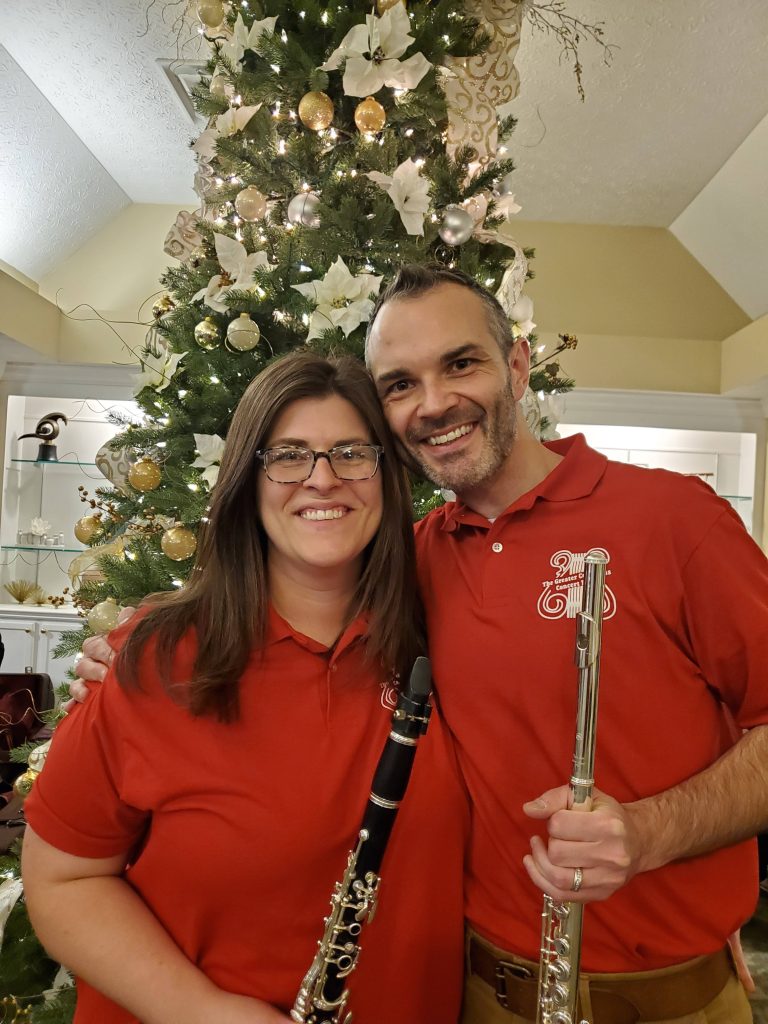
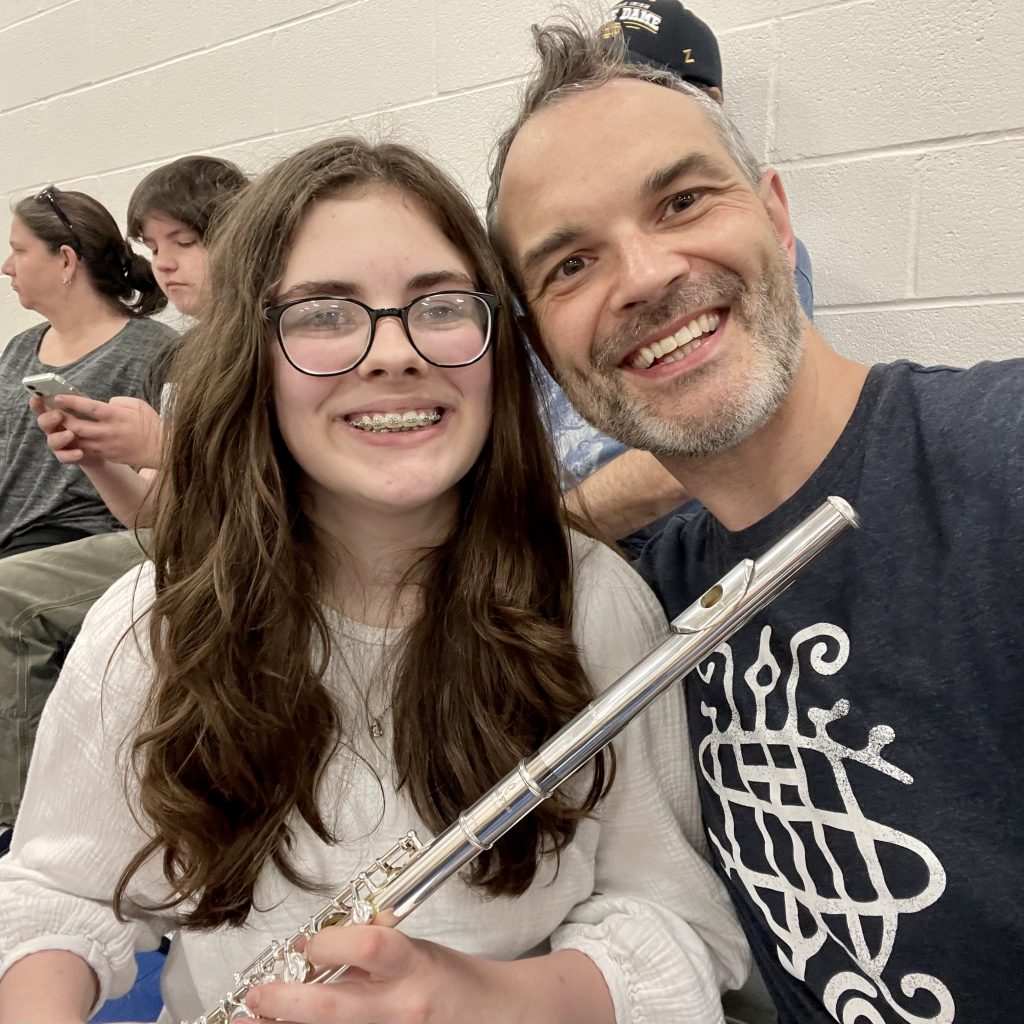
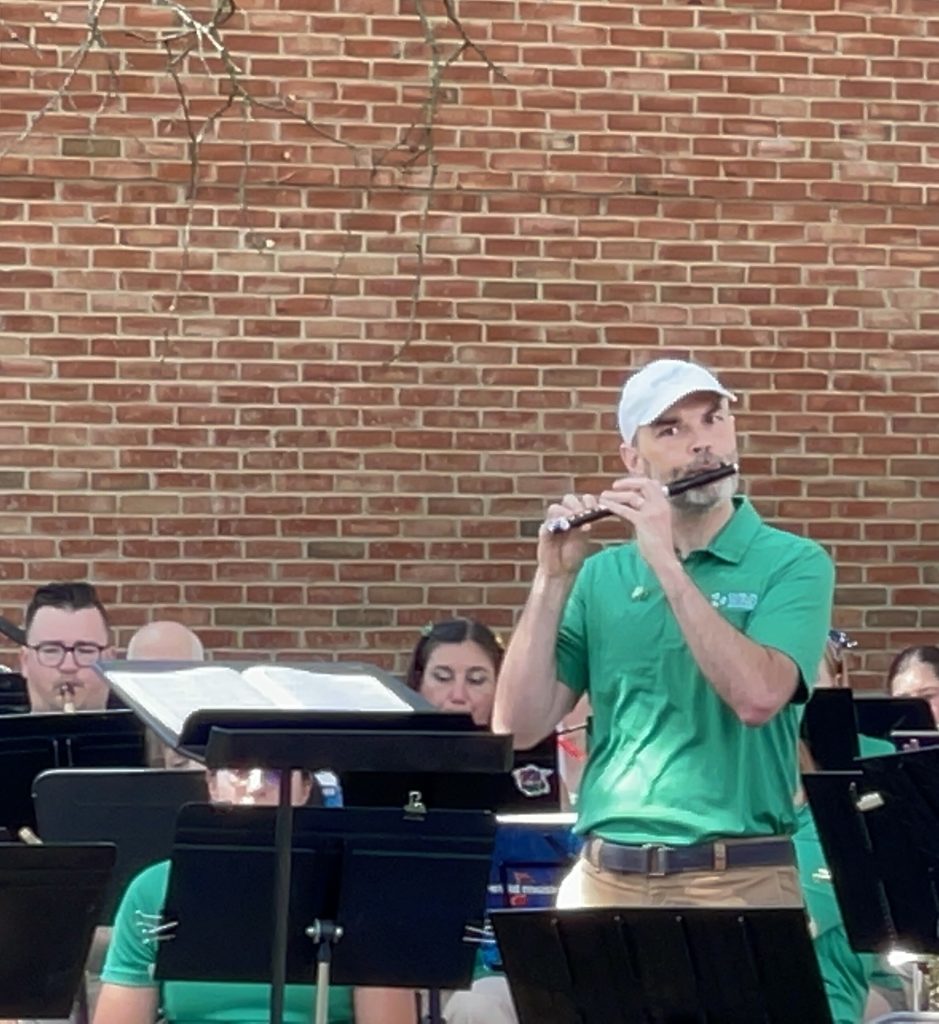
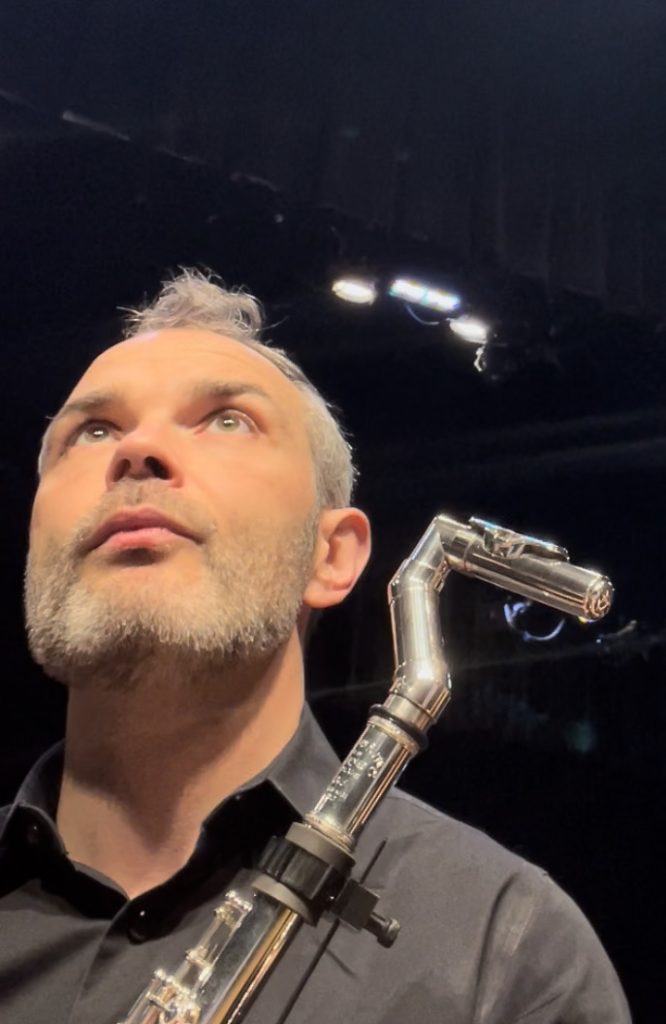
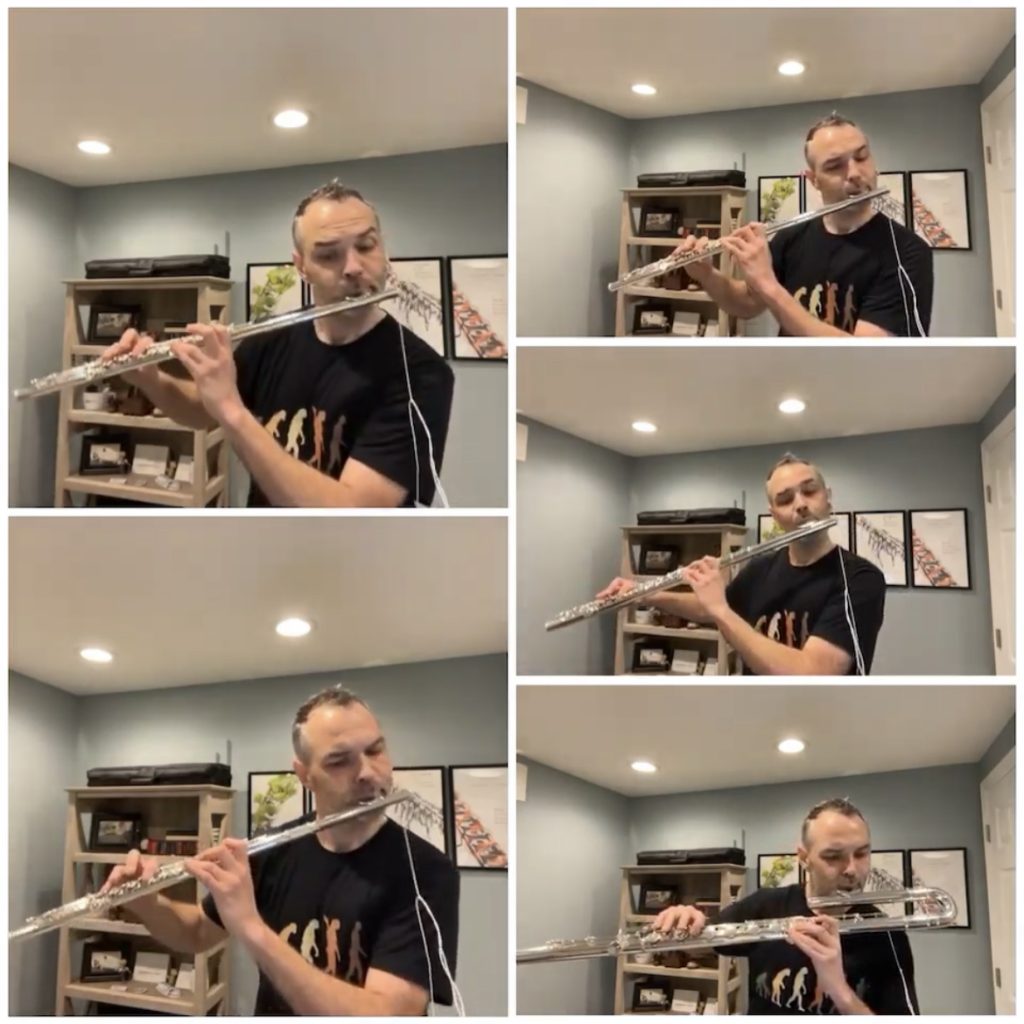


Thank you for publishing this story about Mark. Yes I have seen Mark all over the solo of the month Facebook page. I had an idea of who Matthew is. But no idea about Mark. Other than he was charming and super helpful and encouraging. It’s been a great joy to read this and learn more about him as a person. And his amazing life story. How wonderful to have the wife he has who supports and plays music with him. Very best wishes to the whole Wallace family 🙂